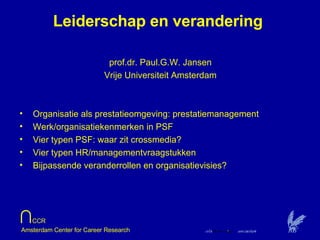Prof. Dr. P.G.W. Jansen "Wat voor soort organisaties zijn cross-mediabedrijven eigenlijk? "
- 1. Leiderschap en verandering prof.dr. Paul.G.W. Jansen Vrije Universiteit Amsterdam Organisatie als prestatieomgeving: prestatiemanagement Werk/organisatiekenmerken in PSF Vier typen PSF: waar zit crossmedia? Vier typen HR/managementvraagstukken Bijpassende veranderrollen en organisatievisies?
- 2. Performance management model Personnel activity ’ā¬ Human resources ’ā¬ Internal performance: - hard performance (in-role) - soft performance (extra-role) ’ā¬ External result (value for ŌĆścustomerŌĆÖ): - productivity (costs, efficiency, effectiveness) - flexibility (learning, change capacity) - legitimacy (with relevant stakeholders)
- 3. Proces van het psychologisch contract waargenomen verplichtingen & beloftes ten aanzien van: beloning, werkinhoud, werkcondities, ontwikkeling ’āó cognitieve evaluatie van nakomen/breuk ’āó gevoel van vervulling/schending: commitment, ontevredenheid, ŌĆ” ’āó neiging tot gedrag: commitment, verzuim, verloop, ŌĆ” ’āó daadwerkelijk gedrag
- 4. Werk/organisatie-kenmerken in professional services (1) Direct klantencontact ’é« internal performance valt samen met contribution to external market. Soft internal performance is cruciaal voor klanttevredenheid. Voordelen : direct feedback, leren, grotere ervaren zinvolheid (varieert wel met type service: van standaard naar ambigu). Nadelen : altijd scherp, houding telt, extra-role behavior=core behavior (commitment bepaalt klantsatisfactie), in-role behavior is hygi├½nisch voor een klant.
- 5. Werk/organisatie-kenmerken in professional services (2) 7. aanpak helder 8. aanpak onhelder 5. aanpak helder 6. aanpak onhelder ONHELDER 3.aanpak helder 4.aanpak onhelder 1.aanpak helder 2.aanpak onhelder HELDER Huidige stand van zaken ONHELDER HELDER Gewenste stand van zaken
- 6. Verschillende w erk/organisatie-kenmerken leiden tot vier typen services. Waar zit crossmedia? personal-interactive: customer intimacy task-interactive: product-leadership niet observeerbaar (wijze van werken) process-interactive procedural: legitimacy maintenance-interactive: operational excellence observeerbaar HOE niet observeerbaar observeerbaar WAT (eindresultaat, probleem oplossen)
- 7. 4 types of professional services organisations Maintenance-interactive services : standardized interaction, routine-professionals, customers knows what (s)he wants, emphasis on operational excellence . Task-interactive services : customer is uncertain about process but certain about goal (ŌĆśproductŌĆÖ). Expert solving unique problems of customer, high level of innovation, emphasis on product-leadership . Professionals with high 'esprit de corps'. Personal-interactive service : unstandardized, intrinsic ambiguity, client and professional are together ŌĆśen routeŌĆÖ, unclear about diagnosis of status quo, about what could be the best goal, about process. Management of indicators, for intake number of diplomas (chance of goal displacement). Emphasis on customer intimacy . Process-interactive : clear work process, unclear goal. E.g. army in peace-time, tax office. Typical for government organizations. Emphasis on procedural legitimacy . Organized around ŌĆśprocedure projectsŌĆÖ (Maister, 1993). Management by process indicators; these may be taken as goals; again chance of goal displacement (procedure becomes goal).
- 8. Vier typen HR/managementvraagstukken ( moet verder ontwikkeld wordenŌĆ”) standardization of work processes mutual adjustment standardization by output direct supervision, standardization by skills (being in) Control normative affective personal reputation smile-factor Commitment procedures social/ interactional technical/ professional routines Competence following the rules relationship expertise efficiency HR-focus bureaucratic culture professional partnership innovation-based pay performance-based pay Governance mechanism Procedural legitimacy Customer-intimacy Product-leadership Operational excellence Type of PSF ’é«
- 9. Rollen van de veranderaar PROFEET *ander meeslepen in eigenideaal *doel: groei, expansie, ontwikkeling *acties: verkopen, overtuigend communiceren, enthousiasmeren *ŌĆØKijk eens!ŌĆØ Domineren (actieve veranderaar) *ander de eigen norm opleggen *doel: planned change, harde prestatie, productiviteit, effici├½ntie *acties: forceren, structureren *ŌĆØGij moet!ŌĆØ AGENT Betrokkenheid (emotioneel) ’éĮ ’éĮ ’éĮ ’éĮ ’éĮ ’éĮ ’éĮ -------------- ’éĮ -------------- ’éĮ ’éĮ ’éĮ ’éĮ ’éĮ ’éĮ ’éĮ ’éĮ (rationeel) Beheersing VRIEND * naar ander luisteren *doel: empowerment, commitment *acties: team building, sfeer verbeteren, conflict management, coaching *ŌĆØWat vind jij?ŌĆØ Respecteren (passieve veranderaar) * het de ander uitleggen (ander=deskundig) *doel:contract, zachte prestatie, instemming *acties: bewaken, berekenen, rationeel-logisch uitleggen *ŌĆØHet is zo datŌĆ”ŌĆØ EXPERT
- 10. Organisatiebenaderingen Open systeem * Losse koppeling organisatie/ omgeving, complexiteit, groei, resources verwerven, leren, informatieprocessen. * Institutionele theorie, sociotechniek, resource dependency, organisatie-ecologie, systeemtheorie, Social Psychology of organizing (Weick). Extern, open * Doelen stellen, plannen, richting geven, sturen. * Contigency theory (Lawrence & Lorsch), transaction costs economics (Williamson), strategic management (Porter), bounded rationality (Simon). Strategische planning Organisatie als proces, informeel, natuur, commitment ’éĮ ’éĮ ’éĮ ’éĮ ’éĮ ’éĮ ------------------------------ ’éĮ ’éĮ ’éĮ ’éĮ ’éĮ ’éĮ ’éĮ Organisatie als ding, formalistisch, ratio, control Natuurlijk systeem * Gericht op intern behoud, geheugen, bewaren & doorgeven, multiple doelen, menselijk gedoe. * Conflict theory, Human Relations (Mayo), Theory X vs Y (McGregor). Intern, gesloten * Structuur, co├Črdinatie, delegatie, administratie. * Scientific management (Taylor), bureaucracy (Weber), administrative theory (Fayol), administrative behavior (Simon). Rationeel systeem










